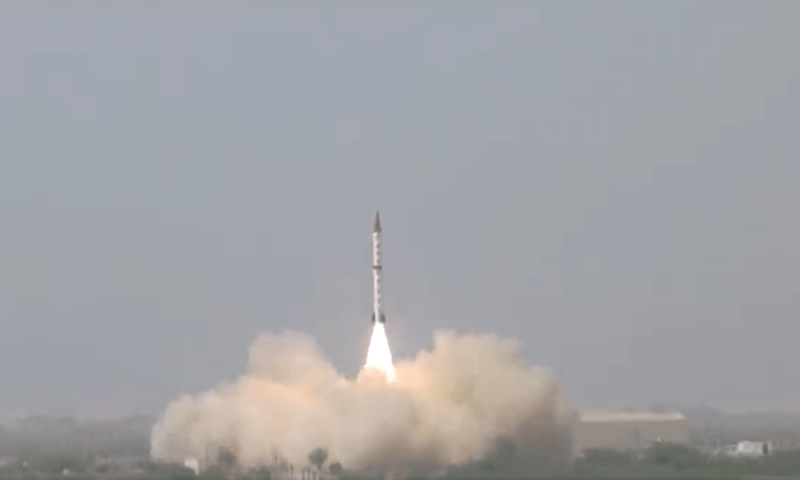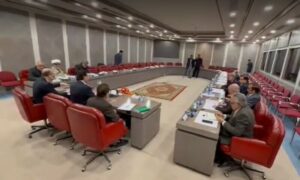The Foreign Office (FO) on Saturday said that the alleged threat perception from Pakistan’s missile capabilities and delivery means raised by a United States official was “unfounded, devoid of rationality and sense of history”.
On Wednesday, the US said it was imposing additional sanctions related to Pakistan’s ballistic missile programme, targeting four entities that it alleged were contributing to the proliferation or delivery of such weapons.
Responding to the sanctions, the FO had said they were “biased” and “endanger regional and international peace”.
Later, Deputy National Security Adviser Jon Finer accused Pakistan of developing long-range ballistic missile capabilities that could eventually allow it to strike targets “well beyond South Asia, including in the United States”.
However, showing caution, Pentagon press secretary Maj Gen Pat Ryder refrained from direct criticism when asked about the US sanctions on Pakistan, adding that the US valued Pakistan as a partner in the region, having “worked closely” with the country on counterterrorism efforts in the past.
Responding to media queries about Finer’s comments today, a statement issued by FO spokesperson Mumtaz Zahra Baloch said, “The alleged threat perception from Pakistan’s missile capabilities and delivery means, raised by the US official are unfortunate.
“These allegations are unfounded, devoid of rationality and sense of history,” she asserted.
Noting that both countries “enjoyed a positive and broad-ranging relationship” since 1954, Baloch said the “recent spate of allegations towards a major non-Nato ally would be unhelpful for the overall relationship, especially in the absence of any evidence in this regard”.
“Pakistan has never had any ill-intention towards the US in any form or manner, and this fundamental reality has not changed,” the FO spokesperson said.
“On the contrary, Pakistan has made monumental sacrifices for this relationship and continues to suffer hugely in sustaining the onslaught of the aftermath of US policies in the region,” the statement highlighted.
It further said it was “regrettable that the US official alluded to bracketing Pakistan with those who are perceived to be in an adversarial relationship with the US”.
“While ignoring and shielding the manifestations of a much more potent missile capability in our eastern neighbourhood, concerns on Pakistani capabilities are being raised seemingly at the behest of others to further accentuate the already fragile strategic stability in the region,” Baloch noted.
“We wish to reiterate that Pakistan’s strategic capabilities are meant to defend its sovereignty and preserve peace and stability in South Asia,” she affirmed.
“Pakistan cannot abdicate its right to develop capabilities that commensurate with the need to maintain credible minimum deterrence as well as evolving and dynamic threats,” the official said.
Baloch recalled that since 2012, “when the US officials started broaching the subject, different Pakistani governments, leadership and officials, have endeavoured from time to time, to positively address and remove the misplaced US concerns”.
“Pakistan has also made it abundantly clear that our strategic program and allied capabilities are solely meant to deter and thwart a clear and visible existential threat from our neighbourhood and should not be perceived as a threat to any other country,” the spokesperson said.
“Hence, any irrational assumption of a hostile intent from Pakistan by any other country including the US is perplexing as well as illogical,” she added.
“In view of the profound sanctity of strategic programme for the people of Pakistan and for the country’s defence, our clear iterations and manifestation of intent and purpose thereof, any attempt to seek intrusion into it, in any form or manner, on any pretext whatsoever, is neither thinkable nor possible.
“There is unshakeable resolve and complete consensus on this aspect across the entire political and social spectrum of the country,” the statement said.
It added that Pakistan “always sought to engage constructively with the US on all issues, including the need to pursue a balanced approach to security and stability in the region”.
“We have a long history of cooperation and wish to build on this strong legacy,” the statement concluded.
Military ties
The Pentagon’s careful positioning highlights its intent to preserve ties with the Pakistani military, a key regional partner in past US-led operations.
Diplomatic sources suggest that the Pentagon’s muted response aligns with its history of maintaining military-to-military relations with Pakistan, even during periods of strained political ties between the two nations.
In contrast, the White House’s more confrontational rhetoric appears to reflect growing frustration within the Biden administration over Islamabad’s strategic direction.
Experts warn that the US approach to Pakistan’s missile programme could further strain relations between the two countries.
As Washington grapples with balancing its strategic interests in South Asia, the contrasting tones from different branches of the US government underscore the complexity of its relationship with Pakistan.







